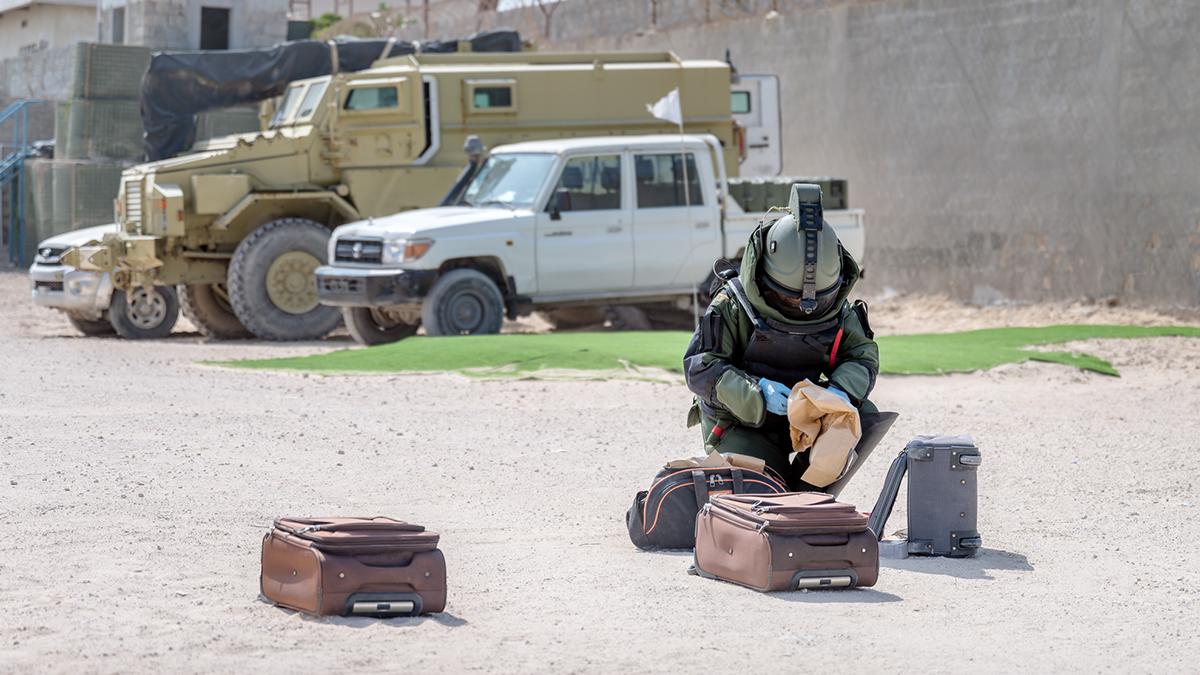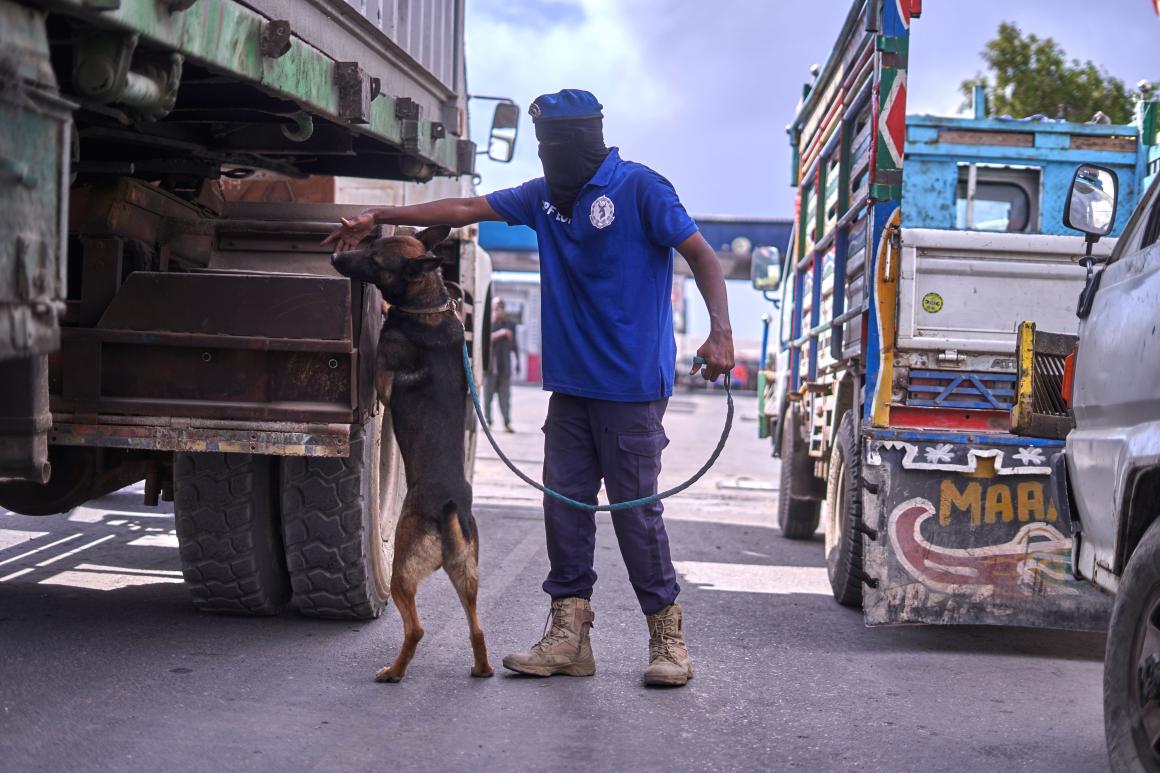
Impact
In Somalia, UNMAS ensures that people are safer and more secure due to the increased ability of Somali national authorities and security services to reduce the threat posed by explosive ordnance (EO), including improvised explosive devices (IEDs).
Since 2009, UNMAS Somalia has supported the African Union Mission in Somalia (AMISOM), now the African Union Transition Mission in Somalia (ATMIS), by delivering tailored training in explosive-threat mitigation and carrying out pre- and post-deployment briefings. From March to April 2024, UNMAS Somalia has supported training over 1,200 troops and facilitated the movement of over 50 ATMIS convoys, especially along main supply routes. In addition, UNMAS Somalia deploys explosive detection dog teams to enhance the safety and security of strategic UN and Government premises. To support stabilisation efforts, UNMAS Somalia has identified and cleared 18 locations contaminated by EO. Moreover, UNMAS Somalia carried out more than 60 village and 60 road assessments/reassessments along main supply routes supporting ATMIS operations. UNMAS Somalia uses Risk Education Talking Devices, an innovative solution to reach communities in remote locations and marginalised groups. More than 6,000 people received risk education, and close to 66 percent of the beneficiaries were children.

About
Over the past years, IEDs have been the weapon of choice of armed groups used against Somali Security Forces (SSF) and ATMIS. However, while SSF and ATMIS remain the most frequently targeted by IEDs, the threat disproportionately impacts civilians, who have made up 56 percent of all IED-related casualties in March-April 2024. Additionally, decades of armed conflict left behind a legacy of explosive ordnance, including landmines, explosive remnants of war, and a proliferation of small arms and light weapons. Both pose a significant risk to local populations and negatively impact peacebuilding and state-building activities.
Mandated by UN Security Council Resolutions (UNSCR) 2710 (2023) and UNSCR 2705 (2023), UNMAS Somalia is an integrated component of the UN Assistance Mission in Somalia (UNSOM) and the UN Support Office in Somalia (UNSOS), providing IED threat mitigation initiatives critical to the successful transition of security responsibilities from ATMIS to the SSF.

UNMAS Somalia provides policy and technical advice to the Federal Government of Somalia (FGS) and the Federal Member States on explosive ordnance threat reduction, weapons and ammunition, and obligations under Article 5 of the Mine Ban Convention according to the UNSOM mandate. UNMAS Somalia also oversees operational explosive ordnance threat mitigation support to ATMIS and the SSF under the UNSOS mandate, which supports the implementation of the Somalia Transition Plan and enhances the freedom of movement and resilience of ATMIS and SSF, the safety and security of UN personnel and assets, the civilian population, and of critical infrastructures such as airports and major routes.
Activities
1. Support the Safety and Security of ATMIS and Mission Personnel Aligned: with the Action for Peacekeeping priorities, UNMAS Somalia contributes to mitigating the IED threat by enhancing a sustainable explosive ordnance disposal (EOD) and IED threat mitigation capacity within ATMIS. UNMAS Somalia provides explosive threat mitigation support to ATMIS Troop Contributing Countries through pre-deployment and in-country training courses, mentoring, advisory services, and the provision of specialised equipment to enable force protection and mobility.
2. Somalia Security Forces Capacity Building: UNMAS Somalia enhances national capacities through training, mentoring, and the provision of equipment to the SSF, including the Somali Police Force and the Somali National Army. UNMAS Somalia enables EOD and IED threat mitigation in line with the Somalia Transition Plan, which calls for the gradual transition of security responsibilities from ATMIS to the SSF.
3. National Mine Action: In coordination with the Somali Explosive Management Authority (SEMA), UNMAS Somalia contributes to community protection in contaminated areas by conducting mine action activities such as survey, clearance, and risk education, thereby restoring access to land and enabling the resumption of livelihood, employment, and increased humanitarian access.
4. Management and Storage of Weapons and Ammunition: UNMAS Somalia also advises the FGS in managing weapons and ammunition in line with Sanctions obligations under the partial lifting of the arms embargo. UNMAS Somalia facilitates the effective management and storage of weapons and ammunition to reduce the risk of unplanned explosions and the proliferation and diversion of small arms and light weapons and their ammunition.

Funding
UNMAS Somalia is funded by UNSOM, UNSOS and through bilateral contributions from the Government of Japan. UNMAS Somalia is seeking additional resources to enhance and sustain the Somali security institutions' national explosive threat mitigation capabilities.

For more information:
Justin Smith
Chief Mine Action Programme
UNMAS Somalia, Somalia
Email: smith84@un.org
Takuto Kubo
Chief of Programmes
UNMAS Somalia, New York, United States
Email: kubo@un.org

